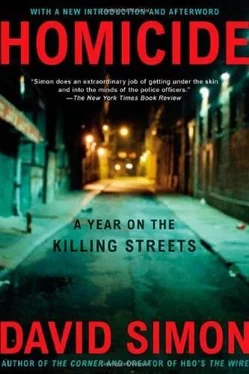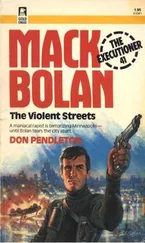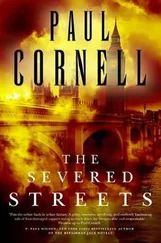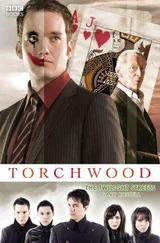“It’s hell getting Harry to take a case,” explained Terry McLarney on one occasion. “You’ve got to grab him by the shoulders and yell, ‘Harry. This one’s yours.’ But once you do that, he’ll work it to death.”
No, Edgerton will not handle his share of suicides, overdose deaths, or cellblock hangings. He will not take orders for anyone else when traveling to Crazy John’s for a cheesesteak, and if asked to bring something back, he will surely forget. No, he will not be a workhorse like Garvey or Worden, a central force around whom the rest of a squad establishes its orbit. And it is true that when some rookie cop fires six-on-the-whistle at the scene of some gas station robbery, Edgerton will probably not volunteer to help sort through witness statements and collate reports. But, if left alone, he will give a squad eight or nine good clearances a year.
Having supervised Edgerton when the two were in the Eastern District, Nolan has for a long time understood the necessary tradeoff. Edgerton was one of the most talented, intelligent patrolmen in Nolan’s sector-even if the rest of the uniforms didn’t know what to make of him. He could be inconsiderate, at times even a little irresponsible, but nothing happened on that Greenmount Avenue post that he didn’t know about. The same was true up in homicide; Edgerton may drift off into the ether for a day or two, but Nolan could be assured that in the end, Harry’s cases would get worked. Hard.
“Don’t worry about it,” Nolan told Edgerton after one of Kincaid’s angry tirades. “You just keep doing what you’re doing.”
For Nolan, the trick was to keep his squad together by keeping the friction points apart. Everyone to his proper orbit: Kincaid with Bowman and Garvey, Edgerton, alone or with Nolan himself when he occasionally needed a secondary. Suddenly, however, that had become impossible.
Twice in the last week, Nolan had overheard Kincaid and Bowman ranting about Edgerton in the main office. That fact alone was unremarkable; everyone threw shit on everyone else in the squadroom. But it was notable that the administrative lieutenant-a pipeline to the captain-was present on each occasion.
A boss was a boss. For one detective to talk trash about another in front of a lieutenant was going too far. And while Nolan, alone among the sergeants, had no great love for D’Addario, he had no intention of seeing Edgerton used as ammunition in any prolonged power struggle.
At least one detective in the squad, Rich Garvey, was equally uncomfortable with that notion. As the man who handled the most calls in Nolan’s squad, Garvey was less than impressed by Edgerton’s work ethic. But he also didn’t want to see a fellow detective, a competent detective, burned over things that should never go further than the squad. Three days ago, at a quiet lunch in a Fells Point diner, he had said as much to Kincaid.
“Nolan lets him get away with too much,” Kincaid said bitterly. “Last midnight shift, that motherfucker was late every day but one.”
Garvey shook his head. “I know it. I know you’re pissed off, Donald,” he told the older detective. “But you have to remember that Nolan would do the same for you. He’d cover for you, too.”
Kincaid nodded, understanding. “I know what you’re saying,” he said finally. “But I’ll tell you, if I was his sergeant, I’d bust his ass so quick he wouldn’t know what hit him.”
“I know you would, Donald.”
The lunch discussion helped establish a temporary truce; there would be no additional scenes in front of the admin lieutenant or any other boss. But Garvey and Nolan both knew that with Edgerton and Kincaid as the players, the problem wasn’t really solved. Sure enough, things are ugly again today, with the admin lieutenant asking questions about Edgerton’s performance on the Payson Street murder. By Nolan’s reckoning, the lieutenant wouldn’t even know to ask about Edgerton’s questioning of that witness at the scene. Not unless some other detective mentioned it.
Edgerton is still fuming about the lieutenant’s comment: “I’d like to hear what it is that he knows about investigating a murder. He wasn’t even there and he’s going to come out of that office and tell me how to do my job.”
“Harry…”
“I got more out of that guy out on the street than he’d get if he brought him in here and talked to him for two days.”
“I know, Harry, just…”
Nolan spends another five minutes trying to placate his detective, but to little effect. When Edgerton goes ballistic, nothing can bring him back down for a few hours, at the minimum. Reaching a pause in his rant, Edgerton wanders off to a typewriter, where he begins pecking brutally at his search warrants.
It doesn’t matter that the PC in both warrants will be strong enough to obtain a judge’s signature. It doesn’t matter that the house on Laurens Street will yield.22 cartridges of a similar make and composition to those found at the scene. It doesn’t matter that when Edgerton and Nolan confront the young man living at that address and take out a pair of handcuffs, the suspect will nod knowingly and say, “I was wondering when you’d come.”
It doesn’t even matter when the same young man breaks down after three hours’ interrogation, implicating himself as the shooter in a full, seven-page statement. Somehow, none of that matters.
Because less than a week after Edgerton’s arrests in the Payson Street murder, the same argument is still raging on. This time it’s Bob Bowman, who shares Kincaid’s opinions when it comes to Edgerton, sitting in the coffee room, telling five or six other detectives that Harry’s case isn’t going to court.
“He has one murder that’s gone down this whole year,” he says. “And I heard from Don Giblin that the case is so weak they’re not even going to take it into a grand jury.”
“You’re kidding me.”
“That’s what I heard from Giblin.”
Only it isn’t true. The grand jury does indeed indict two men for shooting down Gregory Taylor on Payson Street, even after he tried to compensate them for the burn bags. And a prosecutor from the trial division is assigned to bring the case into court. And come fall, a circuit court judge will accept a twenty-year sentence and second-degree plea from the shooter, along with five years and fifteen suspended from the codefendant.
Even so, all of that is irrelevant to the politics. Because in the homicide unit, in his own squad especially, Harry Edgerton has become the accepted target. For the captain, he is ammunition; for D’Addario, a potential liability; for his fellow detectives, an aloof, enigmatic pain in the ass.
On the same morning that the Taylor case goes into the black, Edgerton arrives for roll call to find that his lieutenant has posted a new sheet of yellow legal paper next to the board.
“Hey, Harry,” says Worden, pointing to the slip of paper. “Guess what?”
“Aw no,” moans Edgerton. “Say it ain’t so.”
“It’s so, Harry. You’re still up.”
THURSDAY, MAY 26
By measured steps, Patti Cassidy walks her husband into the crowded courtroom, where all is suddenly silence. The jury, the judge, the lawyers-the entire assembly sits transfixed as Police Agent Gene Cassidy stretches his right hand, touches a wooden beam, then guides himself into the witness stand. Patti touches his shoulder, whispers, then retreats to a seat behind the prosecution table.
The clerk rises. “Do you swear to tell the truth and nothing but the truth?”
“I do,” says Cassidy, his voice clear.
In a place where partial victories and gray equivocations always seem to dominate, Gene Cassidy’s appearance on the witness stand is a startling moment. Cassidy did not see Terry McLarney and Corey Belt and the other Western men in the hallway, gripping his shoulders with a few attaboys and go-get-’ems before the courtroom doors opened. He cannot see his wife, primly dressed and eight months’ pregnant, in the gallery’s front row. He cannot see one of the jurors, the young white girl, crying softly in the back tier. He cannot see the cold rage on the judge’s face, and he cannot see Butchie Frazier, the man who blinded him with two.38 rounds, staring with strange fascination from the defense table a few feet away.
Читать дальше












